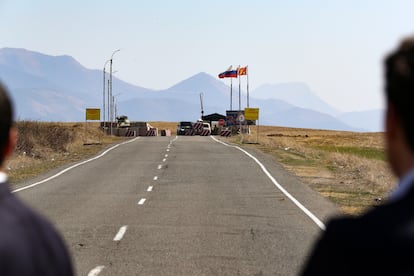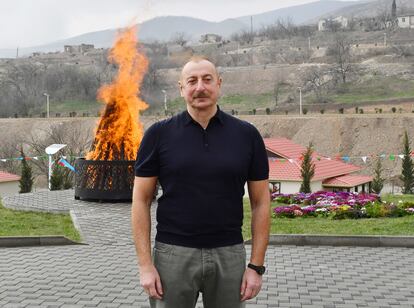The siege on Nagorno-Karabakh tightens, increasing tension in the Caucasus
After more than 100 days of blockade by Azerbaijan, only emergency supplies are making their way into the disputed enclave, and there are reports that Russian soldiers are seeking to profit from the shortages


The siege on Nagorno-Karabakh continues to tighten. In the last week, Azerbaijani troops have crossed the separation line that was agreed two years ago to stop the war between Azerbaijan and Armenia, and these soldiers have taken a strategic summit. The goal is to control a road that, according to Azerbaijan, is used to supply weapons to this Armenian-held enclave located in territory internationally recognized as Azerbaijan.
Instead, according to local authorities, this mountain road had become the only way to bypass a blockade that Azerbaijan has been subjecting the territory to since December 12, when alleged environmental protesters, with the support of security forces, blocked off the Lachin corridor, a road that connects with the Republic of Armenia and is vital for the survival of the enclave. Experts fear that these moves, and the skirmishes over the past few weeks — three Karabakh police officers and two Azerbaijani soldiers were killed on March 5 — are a prelude to larger clashes.
Among the enclave’s population, these military movements awaken the worst ghosts of the past. In 1991, a few months before the collapse of the Soviet Union, Azerbaijani troops began to advance to stop the Karabakh movement seeking to incorporate the disputed territory into Armenia (which led to a three-year war with over 20,000 dead that the Armenians won). More recently, in 2020, a new war over Nagorno-Karabakh ended in victory for Azerbaijan after six weeks of combat and more than 7,000 deaths.
That conflict ended with the signing of a ceasefire between Armenia and Azerbaijan mediated by Moscow, according to which a Russian contingent would be in charge of guaranteeing compliance with the agreement and free transit through the Lachin corridor. However, although Moscow has criticized recent military movements, the Russian military has become largely a silent witness to Azerbaijani actions.
Zaur Shiriyev, an analyst for the International Crisis Group in Azerbaijan, explains that “Russian peacekeeping forces have no technical mandate. Moscow has pressured Baku [the capital of Azerbaijan] to establish rules on the use of force, but it has refused. So the Russian military cannot act against Azerbaijan, they are only allowed to defend themselves if they are attacked.”
“Stores are still empty”
In Stepanakert, the capital of the Nagorno-Karabakh enclave, people have become accustomed to eating rice, pasta and canned food, day after day. The arrival of spring has added a little more variety to their diet, since some wild herbs can be collected. But fruit, vegetables and greens are mostly unaffordable. “For a kilo of potatoes you have to pay 4,500 dram [€10.70], when last year they used to cost 1,000 or 1,500. Tomatoes also cost 4,500 dram. For meat, there is only pork and chicken, locally produced, but very expensive. The question is not even the price of products, it is their absence: the stores are still empty, and when something does show up, it sells out quickly,” explains Nona Poghosyan, a resident of Stepanakert.
In an enclave where 90% of food was being imported from the neighboring Republic of Armenia, the siege has been an unprecedented disaster. Before the blockade, some 400 tons of products were transported daily to Nagorno-Karabagh through the Lachin corridor. But now only a tenth of that amount is arriving, just what the trucks of the Russian peacekeepers and the Red Cross are allowed to transport. And the price problem has been aggravated because, according to testimonies collected by Novaya Gazeta, Russian soldiers are trying to take advantage of the situation by charging “several thousand dollars” for each truckload they bring in. A source from the de facto government of Nagorno-Karabakh confirmed to this newspaper that there have been “certain problems” of this type, but that they are trying to solve them “with the Russian commanders.”
To the scarcity of raw materials and food, energy must now be added. Nagorno-Karabakh authorities reported that Azerbaijan has cut the high-voltage power line that provided them with electricity and that, since January 9, they have depended on meager local production that implies six-hour-a-day supply cuts. The gas pipeline that communicates with Armenia also suffers from periodic interruptions. As a result, the Armenians of Nagorno-Karabakh have had to get used to candles and stoves that they feed with the firewood they cut down from their forests. Close to a fifth of the companies that were operating in the territory have had to shut their doors, and thousands of workers have become unemployed.
Artak Beglarian, advisor to the Nagorno-Karabakh government, complains: “They are aggravating the blockade and its humanitarian consequences to force us to give up.” Beglarian assures that the authorities of the enclave are willing to discuss “rational solutions” to the conflict, but he also warns that, with each resigned acceptance by the Armenians, new demands from Azerbaijan will follow “because they feel impunity” due to the lack of international pressure. For example, a month ago, Minister of State Ruben Vardanian was forced to resign because it was one of the demands made by the government in Baku, which considered him to be a man from Moscow. But the situation did not change afterwards. “Since we are being falsely accused of importing weapons, we have proposed installing devices to scan all entering vehicles. They have not accepted that, either. What they are looking for is ethnic cleansing,” says Beglarian.
Deaf ears to the International Court of Justice
In late February, the International Court of Justice, a United Nations body, demanded that Azerbaijan immediately reopen the Lachin corridor until this court issues a final ruling on the case. But the government of Azerbaijani President Ilham Aliyev (in power since 2003) has ignored the ruling. “Until Baku manages to establish some control over the Lachin corridor and the demilitarization of the local Armenian forces is ensured, it seems that the crisis will continue,” argues Zaur Shiriyev. According to this analyst, as a result of the war in Ukraine, Azerbaijan has seen Russia’s weakness and is trying to take advantage of it to regain full control over Nagorno-Karabakh.

Araz Imanov, an advisor to the Azerbaijani government for the Nagorno-Karabakh region, wrote last week: “Everything that is within our internationally recognized borders can and should be controlled by us. [Establishing a] checkpoint [in the Lachin corridor] is only a matter of time, and the sooner it is established, the better.” However, for the Armenians, an Azerbaijani-controlled post is unacceptable. Beglarian, an advisor to the Karabakh government, replies: “Given their racist policy against the Armenians, it would be very dangerous for us. In addition, nothing similar is contemplated in the ceasefire agreement of 2020.″
Contacts between the two parties have not gone well, so the Russian and U.S. governments have put their diplomats to work and there have been telephone conversations between various capitals. However, the solution to the dispute seems far away. And this, according to the analyst Shiriyev, is causing “a high risk of a military escalation in the coming days or weeks.”
Sign up for our weekly newsletter to get more English-language news coverage from EL PAÍS USA Edition
Tu suscripción se está usando en otro dispositivo
¿Quieres añadir otro usuario a tu suscripción?
Si continúas leyendo en este dispositivo, no se podrá leer en el otro.
FlechaTu suscripción se está usando en otro dispositivo y solo puedes acceder a EL PAÍS desde un dispositivo a la vez.
Si quieres compartir tu cuenta, cambia tu suscripción a la modalidad Premium, así podrás añadir otro usuario. Cada uno accederá con su propia cuenta de email, lo que os permitirá personalizar vuestra experiencia en EL PAÍS.
¿Tienes una suscripción de empresa? Accede aquí para contratar más cuentas.
En el caso de no saber quién está usando tu cuenta, te recomendamos cambiar tu contraseña aquí.
Si decides continuar compartiendo tu cuenta, este mensaje se mostrará en tu dispositivo y en el de la otra persona que está usando tu cuenta de forma indefinida, afectando a tu experiencia de lectura. Puedes consultar aquí los términos y condiciones de la suscripción digital.








































